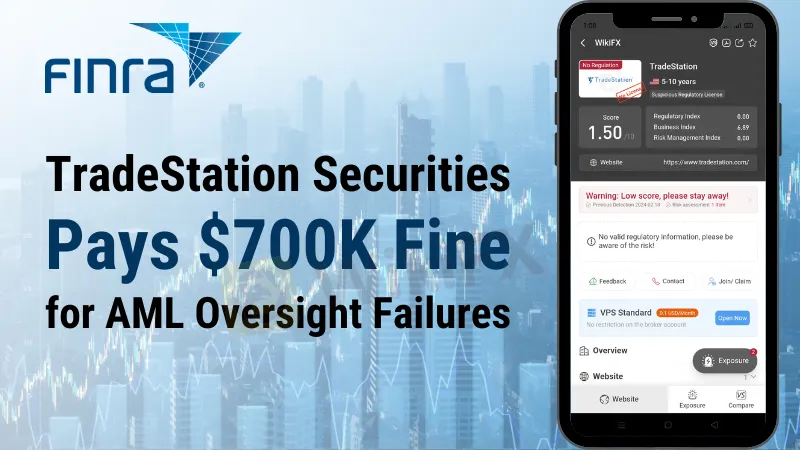简体中文
繁體中文
English
Pусский
日本語
ภาษาไทย
Tiếng Việt
Bahasa Indonesia
Español
हिन्दी
Filippiiniläinen
Français
Deutsch
Português
Türkçe
한국어
العربية
TradeStation Securities Pays $700K Fine for AML Oversight Failures
Abstract:TradeStation Securities fined $700K by FINRA for AML program failures from 2016-2022, highlighting the need for robust compliance in financial trading.

TradeStation Securities, Inc. agreed to pay a $700,000 fine after a settlement agreement with the Financial Industry Regulatory Authority (FINRA). The outcome of the decision is the comprehensive review of the firm's Anti-Money Laundering (AML) practices, which lasted from January 2016 to March 2022.
The main issue in this settlement was TradeStation's failure to design and properly run an AML program capable of detecting illicit trading activity by its clients. Initially, a third-party vendor's automated monitoring system relied heavily on the firm. Between 2016 and 2019, this algorithm generated over 100,000 transaction notifications, averaging 100 alerts each trading day. The enormous number of false positives among these warnings posed a considerable barrier to recognizing true suspicious actions.
The lack of workers designated to monitor these notifications exacerbated the issue. Only two to three compliance analysts, already overburdened with other responsibilities, were entrusted with reviewing these notifications. Their responses to the notifications varied with choices such as rejecting them without further action, giving cautions to customers, banning trading in certain assets, or even canceling customer accounts. However, a fundamental flaw in their methodology was the uneven documentation of their results and conclusions, which proved to be a crucial omission.
Recognizing the need for improvement, TradeStation switched vendors in 2019, seeking to achieve better outcomes. The new strategy reduced false positive alarms, making it more successful. Furthermore, in 2020, in tandem with its business expansion, the company increased its workforce by hiring three additional analysts to help with alert evaluations.

Despite these improvements, the firm's experts did not always flag possibly suspicious trades for additional inquiry. This contradiction was a major vulnerability in TradeStation's AML software. Annual independent AML testing reports in 2016 and 2017 have previously identified these flaws, underscoring the need for better documentation and monitoring of escalated concerns. However, it was not until March 2022 that the firm fully integrated these recommendations into its systems.
TradeStation violated many FINRA standards by failing to consistently escalate certain potentially suspicious trading operations for inspection and by failing to have a well-designed process in place to oversee the evaluation and resolution of alarms. The business specifically breached Rule 3310(a), which governs the implementation of AML systems, as well as Rule 2010, which governs the maintenance of high standards of commercial honor and equitable trading practices. The company also violated FINRA Rule 3110 by failing to create written supervisory procedures (WSPs) for accepting and reselling low-priced securities.
As a result of these findings, TradeStation has accepted a reprimand as well as a substantial $700,000 punishment. This episode emphasizes the vital need for comprehensive and timely AML processes in the financial industry. The intricacies and changing nature of financial trading require ongoing monitoring and agility in compliance processes.
TradeStation's case serves as a strong reminder to other financial institutions of the necessity of complying with regulatory requirements and the need for continual improvements in their AML procedures to maintain the integrity of financial markets and prevent illegal activity.
For more details on this story and daily updates on financial market news, visit WikiFX's news section at https://www.wikifx.com/en/news.html. Stay informed!

Disclaimer:
The views in this article only represent the author's personal views, and do not constitute investment advice on this platform. This platform does not guarantee the accuracy, completeness and timeliness of the information in the article, and will not be liable for any loss caused by the use of or reliance on the information in the article.
Read more

MultiBank Group Wins Big at Traders Fair Hong Kong 2024
Discover how MultiBank Group, a global leader in financial derivatives, secured three prestigious awards at Traders Fair Hong Kong 2024, highlighting its innovative trading solutions and industry excellence.

CySEC Settles Compliance Case with Fxview Operator Charlgate Ltd
Discover how CySEC resolved compliance issues with Charlgate Ltd, the operator of Fxview, through a €50,000 settlement. Explore the investigation, regulatory measures, and CySEC's new website designed for improved accessibility and transparency.

TradingView Launches Liquidity Analysis Tool DEX Screener
Discover TradingView's DEX Screener, a powerful tool for analyzing decentralized exchange trading pairs. Access metrics like liquidity, trading volume, and FDV to make smarter, data-driven trading decisions.

Doo Financial Expands Reach with Indonesian Regulatory Licenses
PT. Doo Financial Futures, a subsidiary of the global financial services brand Doo Group, has secured regulatory approval from Indonesia’s Badan Pengawas Perdagangan Berjangka Komoditi (BAPPEBTI).
WikiFX Broker
Latest News
Volkswagen agrees deal to avoid Germany plant closures
Geopolitical Events: What They Are & Their Impact?
Top 10 Trading Indicators Every Forex Trader Should Know
WikiEXPO Global Expert Interview: Simone Martin—— Exploring Financial Regulation Change
TradingView Launches Liquidity Analysis Tool DEX Screener
MultiBank Group Wins Big at Traders Fair Hong Kong 2024
'Young investors make investment decisions impulsively to keep up with current trends' FCA Reveals
Why Do You Feel Scared During Trade Execution?
CySEC Settles Compliance Case with Fxview Operator Charlgate Ltd
Malaysian Influencer Detained in Taiwan Over Alleged Role in Fraud Scheme
Currency Calculator


